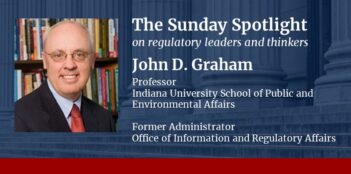303 Creative and Constitutional Law by Stipulation
The Supreme Court undercut antidiscrimination law in a case where the key issues were stipulated by the parties, leaving lower courts little guidance in how to apply its ruling.
States Renew Push for Medicaid Work Requirements
Scholars evaluate the impact of work requirements on Medicaid beneficiaries.
Week in Review
Federal agencies seek comments on draft merger guidelines, OIRA encourages agencies to increase public participation in the regulatory process, and more…
With Its Student Loan Decision, the Court Again Limits Agency Authority
In Biden v. Nebraska, the Supreme Court again asserts its own authority to make society’s most important policy choices.
Standing and Vacatur in U.S v. Texas
The U.S. Supreme Court holds that states lack standing to challenge immigration prioritization guidelines.
Constitutional Challenges to Agency Adjudication
The Supreme Court grants district-court jurisdiction in an opinion hampering agencies’ adjudicatory authority.
Is It Time to Re-Fuel Airline Regulation?
A Penn Program on Regulation panel considers the merits of reforming U.S. aviation regulation.
What’s Left, And What’s Next, for Racial Diversity in College Admissions
The Supreme Court has severely limited more than 45 years of precedent holding it constitutional for colleges and universities to consider race in admissions.
Regulatory Reform Through an Equity Lens
John D. Graham discusses reforming the regulatory process to prioritize equity.
Seeking Suggestions on Noise Pollution
Scholars recommend policies to address the harms of excessive noise.
Week in Review
FDA approves the first birth control pill available over-the-counter, EPA proposes stricter regulations on lead-based paint, and more…
The Supreme Court’s Wetland Saga Continues
Rejecting federal agencies’ interpretation of the Clean Water Act, the Supreme Court limits the application of federal law over wetlands.











